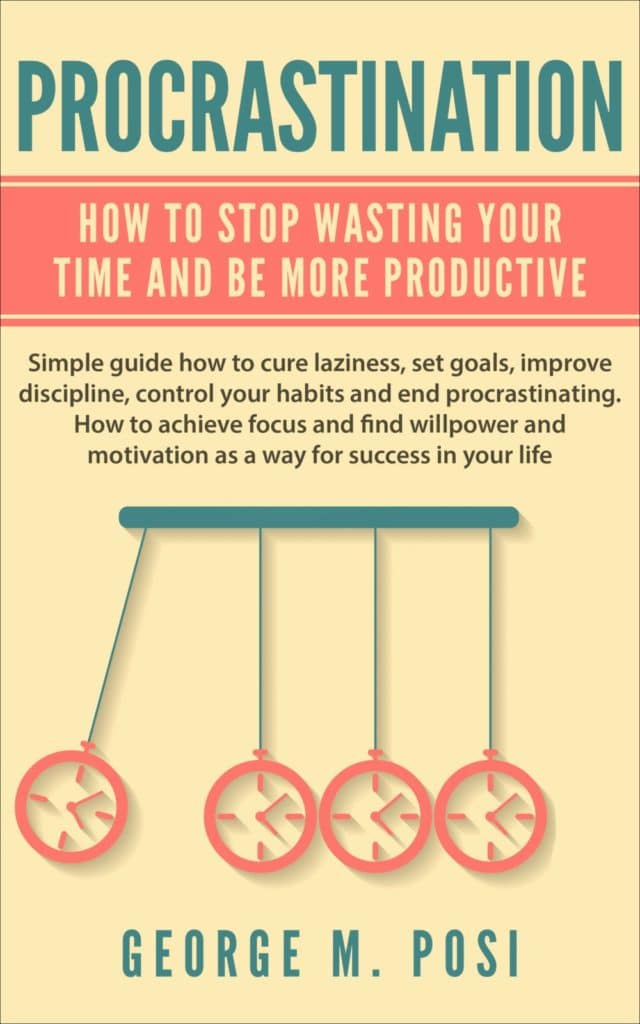In everyday life, you are constantly battling stress, anxiety, and all kind of restlessness. If you invest a little bit of time in improving your mental state, you can soon feel much better. Mindfulness will help your productivity.
What is procrastination?
Even the most organized people do sometimes fritter away hours focused on trivial things. They browse away on the internet aimlessly or binge-watching their favorite sitcom on Netflix when they know they should have devoted that very time to something more meaningful. So, how mindfulness can help your productivity?
While on the surface, occasional procrastination is not that harmful, if you become a chronic procrastinator, then it negatively affects your productivity and eventually your prosperity and happiness.
How to overcome procrastination?
Every journey to a goal begins with a commitment; a commitment to improving, to have better control of your nerves and to work with dedication and perseverance towards the end goal to eventually actualize it.
Besides, to do all of the above, pay attention to your needs and do things you enjoy. Often, procrastination is your way to vent out the in-built frustration because you haven’t been able to do things you enjoy. If you have been working hard for a long time and haven’t done anything enjoyable for long, you are likely to lean towards meaningless activities. Those activities can then trigger your habit to procrastinate and create bigger problems for you.
A good way to keep that from happening is to devote some time to your needs of enjoyment and entertainment occasionally. Make it a daily or weekly ritual to engage in some enjoyable activity such as painting, dancing, listening to music, or anything else that mitigates your stress and helps you breathe. When you consistently spend some quality me-time, you feel better and content with yourself and can easily motivate yourself to work on your high priority tasks on time.
How bad is stress for you?
Regardless of what the source of your stress is, you might already be feeling hopeless and miserable because you cannot live life normally. You may not be happy or productive at your place of work. You are always making enemies, and you probably even have to deal with some emotional and mental issues such as anxiety, panic attacks, and phobias that are driving you crazy. So mindfulness is important for higher productivity.
If you have ever been stressed, you know the effects of stress; you can’t think straight anymore, you’re always anxious and can’t achieve anything meaningful because of lack of motivation and poor productivity, things seem not to go as you would want them to and you are generally not in a great place.
I understand that when you are stressed, it can be tough for you to focus, make sound decisions, and properly think things through or even recall the simplest things. The stress may contribute to extreme irritability, which makes you easily impatient with other people and frustrated and at times even causing depression, feelings of insecurity, anger, and conflicts in your relationships.
The physical effects of stress can also be very overwhelming; you might also be experiencing muscle tension, which is one of the most common physical reactions to stress. I know that to a certain level, stress can trigger tension headaches and even migraines, among other musculoskeletal conditions. By extension, your digestive system could also be suffering under the effects of stress, particularly considering that stress affects the nutrients being absorbed by the intestines.
It also influences the speed of the food movement through your body, which means that you may already be eating less or more than you would normally do. Moreover, I know that this disruption of the natural digestive processes of your body can lead to pain, vomiting, constipation, diarrhea, acid reflux, nausea, and heartburn. One or two of these issues can easily make your life utterly unbearable.
In other words, what you’re going through is already damaging and can get worse if you don’t do anything about it; even worse, ignoring or trying to acclimate yourself to these effects can only make things a lot worse.
Before we talk about the stress management techniques, let me give you a bit of insight into what goes on in your body when stressed.
What happens when stress strikes?
When you are stressed, there are physical and chemical changes your brain undergoes which affects its normal functioning. When your stress levels are high, the body releases stress hormones like cortisol.
Cortisol does several things in your body such as increasing your blood pressure, and heart rate and your immune system become weak because your body is concentrating on what is important and that is to “fight or flee” the stressor.
If you don’t make an effort to control the stress, it may become chronic and cause a host of other problems such as stroke, ulcers, heart disease, and asthma. Also, you need to note that a good number of health care experts link chronic stress with many deadly illnesses such as heart attacks and cancer.
Among the reasons is that the reaction of your body to prolonged stress can build up slowly as you try to ‘get used to’ constant stress. Nonetheless, even when you seem to be successfully creating some level of tolerance to stress, your nervous system continues to deal with an overflow in the background which can, in the long run, have a grave impact on your overall health, causing some of the mental and physical issues we discussed earlier.
So, what can you do to make a shift into a healthier pattern, reduce stress and be happier? Practice mindfulness meditation and yoga. They are simple yet one of the most effective techniques we have today.
How to overcome Procrastination?
Mindfulness meditation is a powerful ancient technique that has been used for years particularly to reduce stress, anxiety, depression and achieve inner peace. It has also been used to relieve pain and treat certain illnesses. But what exactly is mindfulness meditation?
Mindfulness meditation re-trains your mind to remain in the ‘now’ or present moment, fully calm as it should be. Many times, we become anxious and stressed because of a disturbing past that we keep thinking about or worrying about a future that you have no control over. With mindfulness meditation, you learn to live in the moment only, as that is what you can change as you have no control over your past or future.
Yoga is another ancient practice that is highly regarded as one of the most effective ways to manage stress, cultivate happiness and peace of mind in addition to reducing body pain, increasing flexibility and body strength. There are many ways to define or look at this restorative practice though- here are some of them:
Achieve productivity and mindfulness
Yoga is a ‘connection’ or ‘union’. In Sanskrit, the word is usually used to denote connection. Yoga can thus be defined as the state of a connection or a set of techniques that let you connect to anything (see the next chapter to have a better understanding).
Looking at it at the most practical level, you will find that yoga is the whole process of being more aware of who you are. Its techniques bring about health and balance and are meant to unfold your dormant, hidden potential. Yoga allows you to be more aware of yourself and feels more connected. It makes the practice a process of self-discovery, which guides you to self-realization and self-mastery. This process will enable you to achieve mindfulness and productivity easier.
Help me to reach to more people
I hope this post was able to help you to learn how to improve productivity and get rid of stress using Mindfulness meditation and Yoga techniques.
The next step is to put your newfound knowledge into action! Connect productivity and mindfulness for a better life.
This post contains excerpts from my upcoming series of books on Productivity and stress relief techniques, Meditation and Yoga. Upcoming books will go more in-depth on the topics described in this post. If you like this post, please subscribe to my blog here, get FREE E-BOOK NOW, and get a notification when the next book in series is published.
Read another post about procrastination.
Check out my other books on Amazon.
Enjoy reading!
Share



